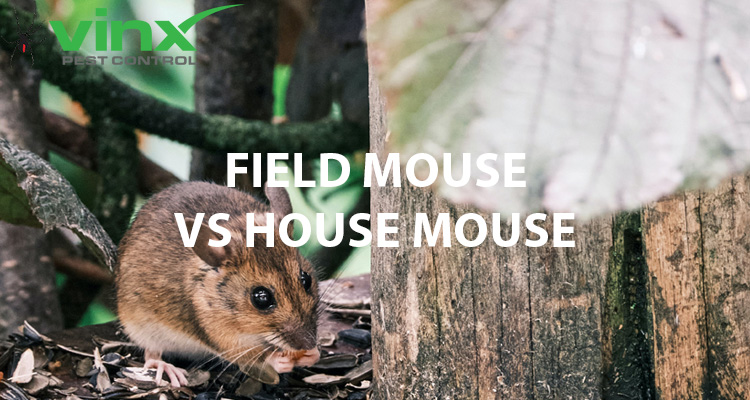Field Mouse vs. House Mouse: Key Differences and How to Get Rid of Them
If you have noticed a mouse in your home, you may be wondering whether it is a house mouse or a field mouse. Both species are common household pests, and knowing the difference between them is important. Mice can contaminate food, damage wiring and insulation, and spread diseases.
This guide will help you distinguish between field mice (deer mice) and house mice, understand the dangers they pose, and learn how to prevent and eliminate them.
What Is a Field Mouse?
The term “field mouse” typically refers to deer mice (Peromyscus maniculatus). These rodents have brown or tan fur with white underbellies, feet, and legs. Their tails are also two-toned—dark on top and light underneath.
Field mice are primarily outdoor rodents, preferring to live in fields, forests, and grassy areas. However, they may enter homes during colder months in search of warmth and food.
Signs of a Field Mouse Infestation
- Small, oval-shaped droppings near food sources
- Gnaw marks on furniture, wires, and storage boxes
- Burrow-like nests in insulation or stored items
- Scurrying sounds in walls or ceilings at night
What Is a House Mouse?
House mice (Mus musculus) have solid-colored coats that are gray or light brown, with nearly hairless tails. They are well-adapted to living indoors and often nest inside homes.
House mice reproduce quickly, meaning a small problem can escalate into a major infestation in a short time.
Signs of a House Mouse Infestation
- Small, scattered droppings that resemble dark grains of rice
- Greasy smear marks along baseboards and walls
- Shredded paper or fabric nests in dark corners
- Persistent musty odor from urine markings
Field Mouse vs. House Mouse: Key Differences
- Appearance – The field mouse will have a white belly and a bi-colored tail, while house mice are solid-colored with hairless tails.
- Habitat – Field mice live outdoors but may enter homes in winter. House mice are indoor dwellers year-round.
- Food Storage – Field mice hoard food near their nests, while house mice eat food immediately when they find it.
Dangers of Field Mice and House Mice
The Field Mouse and Hantavirus
The field mouse is known carriers of Hantavirus, a serious respiratory illness in humans. Hantavirus Pulmonary Syndrome (HPS) can spread through exposure to mouse urine, droppings, or saliva. Proper identification and removal of field mice are critical to prevent this disease.
House Mice and Field Mice Contamination
House mice can contaminate food supplies with bacteria such as Salmonella, leading to food poisoning. They also introduce mites and fleas into homes, creating additional health risks.
Where Do Mice Live?
Where Do Field Mice Live?
Field mice prefer outdoor environments, including:
- Tall grass, fields, and open landscapes
- Tree stumps, logs, and dense brush
- Barns, sheds, and garages
Where Do House Mice Live?
House mice seek shelter indoors, often building nests in:
- Attics, basements, and crawl spaces
- Storage areas, cabinets, and pantries
- Behind appliances, inside walls, and in furniture
How to Prevent Mice from Entering Your Home
Keeping mice out of your home requires proactive prevention measures:
- Seal entry points – Close gaps, cracks, and holes in walls, foundations, and around doors.
- Store food properly – Use airtight containers and secure pet food at night.
- Reduce clutter – Eliminate hiding spots by organizing storage areas.
- Trim trees and shrubs – Prevent easy access to your home.
- Maintain cleanliness – Regularly clean crumbs and wipe down kitchen surfaces.
How to Get Rid of Mice Effectively
If you suspect a mouse infestation, take these immediate steps:
DIY Mouse Control Methods
- Snap traps – Place along walls and near entry points where mice travel.
- Bait stations – Use peanut butter, seeds, or cheese to attract mice.
- Natural repellents – Peppermint oil, cloves, and vinegar can help deter them.
DIY methods may work for minor infestations, but they often fail to eliminate hidden nests.
When to Call a Professional Pest Control Service
For severe infestations with field mice, professional pest control is the most effective solution. At Vinx Pest Control, we offer:
- Thorough inspections to identify nesting areas
- Targeted treatments for field mice and house mice
- Long-term prevention plans to keep mice out permanently
We proudly serve the following locations:
- Dallas, TX – Expert pest control services for mice and rodents in urban and suburban homes.
- Sulphur Springs, TX – Reliable mouse extermination for rural and residential properties.
- Greenville, SC – Comprehensive pest management for homes and businesses.
- Charleston, SC – Specialized rodent control to protect historic and modern properties.
Contact us today for a free estimate. See Pricing Here.
Conclusion: Field Mice vs. House Mice – Know the Difference
Understanding the difference between field mice and house mice can help you take the right steps to prevent and eliminate infestations.
- Field mice (deer mice) are mostly outdoor rodents that may enter homes during colder months.
- House mice are indoor pests year-round, causing contamination and damage.
- Both species pose serious health risks, including Hantavirus and food contamination.
If you suspect a mouse problem, taking quick action is essential. Contact Vinx Pest Control for professional removal and prevention services. Call Now or Request a Free Quote Today.



